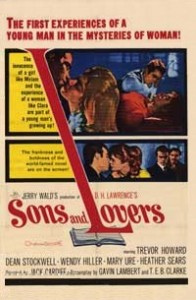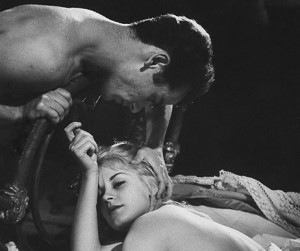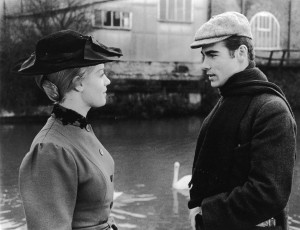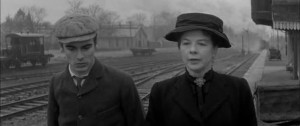Sons and Lovers, Jack Cardiff’s intelligent adaptation of D.H. Lawrence’s famous, autobiographical novel of the same title, is visually exquisite and superbly acted by a largely British ensemble. But, overall, the film is too unfocused to convey the complexities of love and the various romantic and sexual passions that form the center of the book.
Set in Nottingham, the tale focuses on the Morel family, Walter (Trevor Howard), the patriarch miner and his wife Mrs. Morel (Wendy Hiller) and their three sons. The scenario by Gavin Lambert and T.E. Clarke centers on one relationship, that between a mother and her favorite son, Paul Morel (Dean Stockwell, the only American in the cast).
For the sake of brevity and compressions the screenwriters have altered a number of characters and have altogether omitted the figure of one sister. Even so, a good portion of the dialogue is lifted From Lawrence’s book. The father is rigid and macho, and it’s the mother who’s the forceful and central figure, a woman who doesn’t hide the fact that she favors Paul, her sensitive son whose ambition is to pursue the career of an artist in London; the father is of course against his son’s literary inclinations, which offend his sense of class pride. After courting a young girl, Miriam Lievers (Heather Sears), Paul falls for Clara Dawes (Mary Ure), an older woman who is married to Baxter (Conrad Phillips).
Both relationships cause tensions between Paul and his strong-willed mother, who terminates the first one and is irritated by the second. Initially, Paul listens to his mom, though he knows that he should follow his inner feelings, even if it’s painful and hard to detach himself from her; wherever he goes, Paul fells his mother’s presence. It soon becomes clear that Mrs. Morel is obsessive in her love for her son, who’s sort of a substitute for the love she is supposed to give to her husband.
Dramatically, the picture gains momentum, when one of the sons dies in a mining accident, another goes to London, and Paul abandons his dreams in order to comfort and be close to he bereaved mother. After her death, the liberated Paul leaves for the city in an effort to start a totally new life away from the claustrophobic family and town, though the spirit of his mother continues to haunt him. “Sons and Lovers” is effective in conveying how strong attachment to his mother inhibits and suffocates Paul emotionally, but with her death, he finds release & resolves to leave home to pursue interests in the world
By nature, the movie is too episodic, and in sections, too earnest in tone and moderate in temper. But some images are unusually powerful, such as the weekly ritual of the father getting his bath, or the first, awkward sexual encounter between Paul and Clara. There is a haunting scene in which son gives his mother overdose of pain-killing drugs when she is dying agonizingly of cancer.
Headed by Howard, who gives one of his best performances (recognized by the National Board of Review) and Hiller, most of the cast is British. The exception is the American thespian Dean Stockwell as Paul, who in the same year gave another strong performance in Compulsion.
Director Cardiff’s attention to visual detail probably derives from his previous work as a distinguished cinematographer, which contributes immensely to such diverse pictures as the noir in color “Leave Her to Heaven,” “The Red Shoes,” and “The African Queen” (among others).
Brilliantly shot on location by Freddie Francis, who deservedly won an Oscar, the film conveys the drabness of a north-of-England coal town, the intimate confinement of a poor coal miner’s home, the bleakness of the wintry country near Eastwood (where Lawrence was born).
In his only Oscar nominated role, Trevor Howard, a vastly underestimated actor, gives an emotionally towering performance as the discarded miner-father, who’s aware of being unwanted and unloved. His violent bursts, especially when drunk, his complaints about life, and his frequently shifting temper, convey the tragedy of a lonely and alienated man, unable to really connect with his wife or with his sons, even when he wants to or means to.
Though the movie is too straightforward to allow some dramatic arch, and not as powerful as the book, which was shocking when it was published, it’s still one of the best cinematic adaptations of a Lawrence work.
Made on a budget of $805,000, Sons and Lovers was not particularly successful at the box-office, but it has its followers.
Oscar Nominations: 7
Picture, produced by Jerry Wald
Director: Jack Cardiff
Screenplay (Adapted): Gavin Lambert and T.E. B. Clarke
Actor: Trevor Howard
Supporting Actress: Mary Ure
Cinematography (B/W): Freddie Francis
Art Direction-Set Decoration (B/W): Tom Morahan; Lionel Couch
Oscar Awards: 1
Cinematography (B/W): Freddie Francis
Oscar Context
In 1960, a rather weak year, artistically, “Sons and Lovers” competed for the Best Picture Oscar with Billy Wilder’s “The Apartment,” which won, John Wayne’s “The Alamo,” Richard Brooks’ “Elmer Gantry,” and Fred Zinnemann’s “The Sundowners.”
“The Apartment” also won Best Director and Art Director Oscars. Burt Lancaster won Best Actor and Shirley Jones Best Supporting Actress, both for “Elmer Gantry,” which also won the Adapted Screenplay Oscar for Richard Brooks.
Credits
Twentieth Century Fox (Company of Artists production)
Cast
Trevor Howard as Walter Morel
Dean Stockwell as Paul Morel
Wendy Hiller as Gertrude Morel
Mary Ure as Clara Dawes
Heather Sears as Miriam Leivers
William Lucas as William Morel
Conrad Phillips as Baxter Dawes
Ernest Thesiger as Henry Hadlock
Donald Pleasence as Mr. Pappleworth
Rosalie Crutchley as Mrs. Leivers
Sean Barrett as Arthur Morel
Elizabeth Begley as Mrs. Radford
Edna Morris as Mrs. Anthony
Ruth Kettlewell as Mrs. Bonner
Anne Sheppard as Rose
Dorothy Gordon as Fanny
Credits:
Directed by Jack Cardiff
Produced by Jerry Wald
Written by T. E. B. Clarke and Gavin Lambert
Music by Mario Nascimbene
Cinematography: Freddie Francis
Edited by Gordon Pilkington
Distributed by Twentieth Century Fox
Release date: May 1960
Running time: 103 minutes








